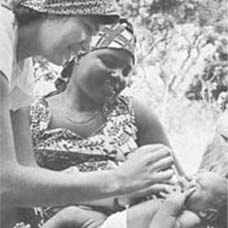
Morocco RPCV Stephen J. King writes Liberalization Against Democracy: The Local Politics of Economic Reform in Tunisia
TUNISIA: Liberalization Against Democracy: The Local Politics of Economic Reform in Tunisia
Jan 1, 2004
Middle East Journal
by Clement H. Henry
TUNISIA
Liberalization Against Democracy: The Local Politics of Economic Reform in Tunisia, by Stephen J. King. Bloomington, IN: Indiana University Press, 2003. xii + 140 pages. Bibl. to p. 154. Index to p. 161. $21.95 paper.
Stephen King argues against the view that free markets and democracy go hand in hand in transitional political economies. Political freedom may be associated with free markets among samples of countries that include advanced capitalist economies, but in late developing countries other dynamics seem to be at work. The author tries to argue that economic liberalization in Tunisia promoted wealthy rural elites who blocked democratizing tendencies by offering new ("neo-traditional") patron-client networks that strengthened the authoritarian regime. Dr. King joins a number of observers who view structural adjustment programs in the Arab world and elsewhere as reinforcing authoritarian trends.
The argument is straightforward, and the book is a good, quick read for undergraduates as well as graduate students and analysts who grapple with these problems. The author cites many related secondary sources about other countries in the throes of adjustment to globalization as an added pedagogic bonus. He spent a year in Tebourba, a village about 60 km. west of Tunis in the fertile Medjerda Valley. He collected numerous interviews with local officials and a broad spectrum of poor as well as prosperous farmers. One of his chapters (pp. 76-109) documents his impressions of "Neo-Traditionalism in Tebourba" with vivid quotations from some of the informants.
They convey the anger of the poor who did not benefit from any land distribution as well as the complacency of the party and government officials leaning upon the wealthier proprietors to distribute generously to their local clients on Muslim holidays. The author shrewdly notes that the state "cannot help but provide conceptual support for the Islamist opposition" by prodding the wealthy to distribute aid "according to an Islamic hierarchy" (p. 107). Perhaps wisely, he did not attempt to code the 45-minute interviews and derive statistical inferences about relationships between landholdings and political attitudes.
He must have gained the confidence of a number of the locals as he converted his spoken Moroccan (learned with the Peace Corps) into Tunisian dialect. Some of his poor (the "below zeros") and middle peasants poured out their grievances to the (Afro-American, p. 111) foreigner: "Small farmers are being run out of farming. The government does not want to divide the land into small parts. Wealthy people will go to the 'umda (mayor) and plan on getting the land in one person's hands. Later they will divide the money with the 'umda" (p. 87).
During the 1960s, Planning Minister Ahmed Ben Salah's agricultural cooperatives swallowed up vast tracts of land, including private Tunisian holdings as well as former French settler estates. After the reversal of Ben Salah's policies in 1969, the lands reverted to the state, which privatized about half of them in the 1970s and 1980s. Under pressure after 1986 to engage in structural adjustment, the state accelerated privatization by leasing them out, so that in Tebourba between 1991 and 1994 notables acquired control over more than half of the remaining acreage. From these raw facts on the ground, King infers that liberalization fosters not political democracy but new "neo-traditional" supports for authoritarianism.
The single-party regime keeps control of the countryside by aligning with wealthy landowners.
King has relied heavily on secondary sources (although he missed Nicolas Beau and Jean-Pierre Tuquoi's Notre Ami Ben Ali, Paris: Editions La Dicouverte, 1999) and summarizes them skillfully. But he does not dig deeply enough into local Tebourba history to discover the notable families and relate them to the new property leaseholders. Nor is it clear whether Tunisia is indeed really liberalizing its economy. The author admits that the World Bank officials were frustrated by Tunisia's refusal to sell or lease state lands in ways that would alleviate rural poverty, and cites one of them that the Bank could not go against policies made in Tunisia at the presidential level (p.
124). Lopsided asset distribution in the countryside surely goes against the grain of Adam Smith and neo-classical liberalism. The author is very much on track in illuminating a widespread pattern that passes for structural adjustment in much of the developing world. The pattern consists of privatizing in the interests of established oligarchies and thereby creating new oligopolies, new sinews of political and economic power, across various commercial as well as agricultural sectors. In Tunisia it would have been interesting to trace Tebourba's winners back to their rural landholding or party nomenklatura roots.
It is ever more difficult to do research in Tunisia, however, and Dr. King was fortunate to have enjoyed access to people even though he could only barely penetrate the secret state archives (p. 115, note 1). He notes that the government even refused to release data about growing economic inequality derived from the 1995 household census data (p. 39).
Clement M. Henry, Professor of Government, The University of Texas at Austin
Copyright Middle East Institute Winter 2004








